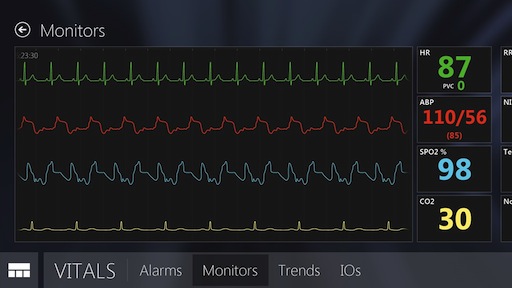 AirStrip ONE running on a Windows 8 device
AirStrip ONE running on a Windows 8 device
AirStrip Technologies, maker of mobile patient monitoring software, is the first healthcare software vendor to join a new Microsoft application development program aimed at expanding the reach of Surface touch-screen tablets into the business world.
Microsoft's new AppsForSurface initiative, introduced Monday, is part of a new corporate strategy, called the Microsoft Devices Program, to market Surface tablets and convertible PCs to enterprises through reseller channels. If, as some tech-industry watchers believe, the move is meant to boost lagging Surface sales and finally get independent software vendors interested in creating apps for Surface and Windows 8, it seems to have hooked AirStrip.
As a mobile app developer, San Antonio-based AirStrip sees the Microsoft connection as its ticket into physician desktops.
"It was important for us to not only do iOS and Android, but also go into Windows," AirStrip CEO Alan Portela tells MobiHealthNews. Joining AppsForSurface and building a mobile Windows versions of its cardiology and obstetrics apps "gives us a desktop version of AirStrip," according to Portela.
That's because Surface tablets have the same Windows 8 operating system as new PCs, and higher-end Surface Pro devices can run the vast amounts of Windows 7 software on the market. That means that apps can look and work the same on mobile devices as they do on office computers.
Portela noted that clinicians have happily flocked to mobile devices and apps because that technology tends to be more user-friendly and convenient than traditional, PC-based health IT. "We can bring the look and feel of mobile technology, which is what clinicians want, to their older desktops and laptops," the AirStrip chief says. "They can now have the same interaction no matter where they are at."
Healthcare reform also is driving demand for mobile access, according to Portela. "The Affordable Care Act and sequestration has accentuated the need for mobility" by encouraging a shift toward patient-centric care that does not have to take place in traditional settings, he says. The Microsoft initiative, Portela says, "will accelerate adoption of mobility in healthcare."
AirStrip has been pushing the unified view since at least February, when the company launched its AirStrip One system, a mobile platform that provides clinicians with an integrated view of patient data from multiple sources, including EHRs, medical devices and patient monitors.
Microsoft also has been sharing the story of Palmetto Health in Columbia, S.C., an early enterprise adopter of Surface Pro. There, physicians are carrying Surface computers that offer the power of a PC and the portability of a tablet, according to an account from Dr. Bill Crounse, Microsoft's worldwide senior director for health.
"The problem with the iPad is it just doesn’t have the horsepower to do the complexity of our EMR. You have to go to a remote sign-on which is extremely slow," Palmetto Health physician Dr. Nick Patel is quoted as saying.
Microsoft has a long way to go to catch Apple in the tablet market, but the convergence of tablet, smartphone and PC is just beginning.
For more on tablets in healthcare, be sure to get your copy of MobiHealthNews' 2013 report: iPad vs the Tablets in Healthcare.


















